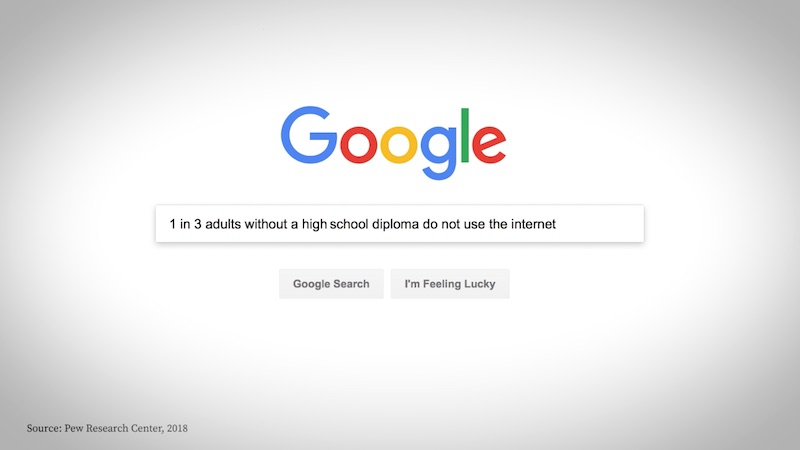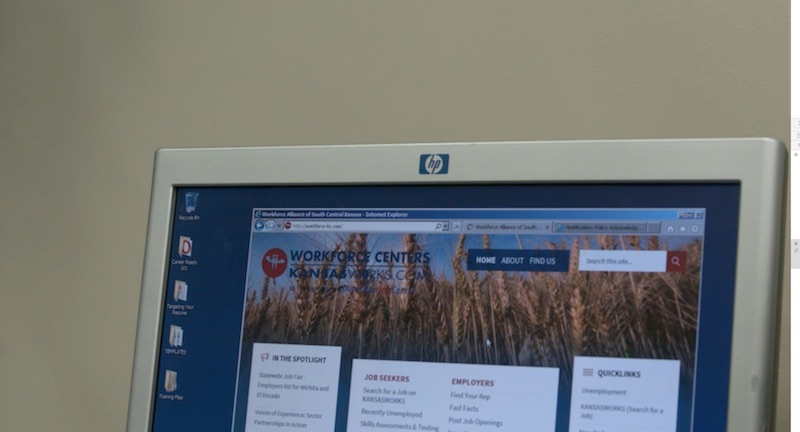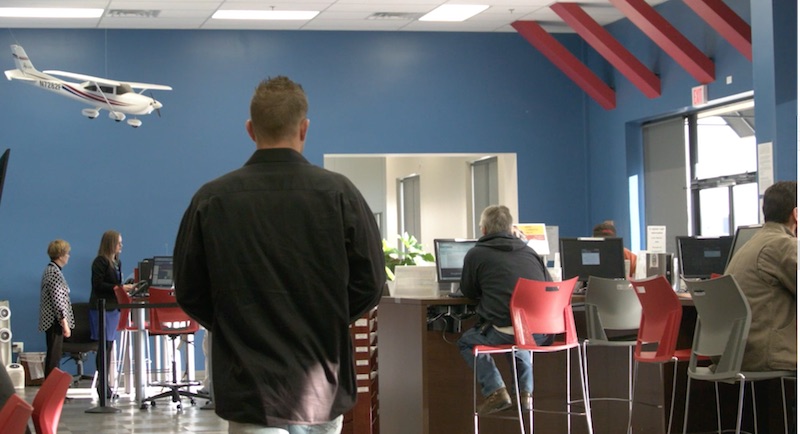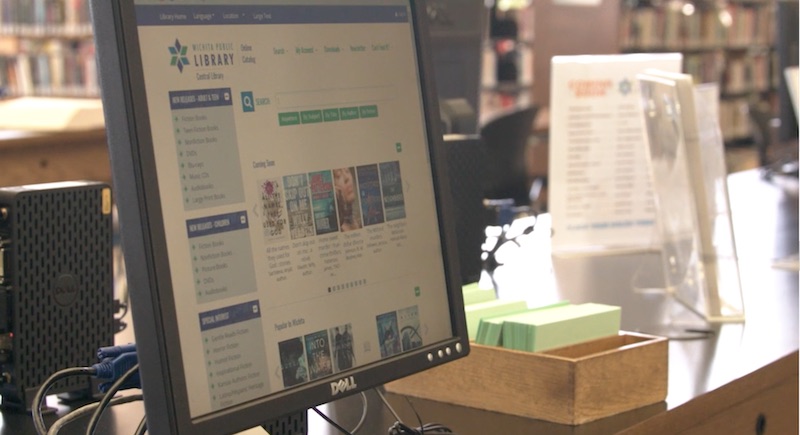HUMAN CAPITAL IN THE DIGITAL AGE.
The economic engine of the community runs best when the employment needs of businesses are in balance with the size and makeup of the workforce. Finding alignment of the two is the crux of Wichita's human capital challenge.
An individual's comfort level with technology, or digital literacy, factors into the equation — especially as firms look to hire more people with digital skills, and the job search process becomes increasingly dependent on electronic communication.
Watch this short video to get the lowdown on digital literacy.
DIGITAL COMPETENCY & COMPREHENSION
Digital literacy encompasses everything from sending an email to using complex software. Mike Mayta, Chief Information Officer for the City of Wichita, says it boils down to having "the ability to function in a digital society."

Jeff Tate, Digital Services Manager for the Wichita Public Library, narrows it into two categories: digital competency and digital comprehension.

Digital competency is like literacy in reading. You know how to sound out the words — or fill out the online forms, send the emails and set up the social networking profiles. Digital comprehension is a lot like reading comprehension. You know which emails could hold computer viruses and use social media cautiously to protect your privacy.
There is a group of people [for whom] things like email, filling out a job application — even going to a website — can sometimes be trickier than you'd think.Jeff Tate
"In today's economy, I think digital literacy is extremely important in both sections," Tate says.
Digital natives — mostly millennials who grew up with the internet — have the competency part down, Tate says. But even they sometimes struggle with comprehension.
Non-digital natives often need basic online skills to get jobs, even if they're working in blue-collar fields.
"There is a group of people [for whom] things like email, filling out a job application — even going to a website — can sometimes be trickier than you'd think," Tate says. "Even in what we would consider traditional blue-collar jobs, you're still filling out your time sheet online. You're communicating with your bosses on email. You're going to be doing those kinds of things."
OPPORTUNITY & ACCESS
For those without the digital skills necessary to find a job, it can be somewhat daunting to attain them. First, you need access to a computer. Then, you need access to training on how to use that computer.
Fortunately, there are plenty of opportunities to get both in Wichita, free of charge.

"[Access] is the biggest thing," says Amanda Duncan, Vice President and Chief Business Development Officer for the Workforce Alliance of South Central Kansas (WASCK). "Many individuals might not have the tools they need to access the technology at their home ... so we just open our doors for access."

WASCK is a program funded by the U.S. Department of Labor to help individuals find jobs and companies find talent. Each year they serve more than 50,000 job seekers and work with more than 750 businesses.
Technology is changing the workplace. We're going to see more and more workplaces adding things like artificial intelligence and virtual reality.Amanda Duncan
WASCK operates four centers across the region, but the Wichita Workforce Center at 2021 North Amidon is the most advanced. There, jobseekers not only have access to technology, but also to training opportunities on topics such as getting acquainted with basic technology and obtaining Microsoft Office certification.

"Technology is changing the workplace," Duncan says. "We're going to see more and more workplaces adding things like artificial intelligence and virtual reality."
Access and opportunity are also available — again, free of charge — through the Wichita Public Library.
"I think a lot of people still remember libraries as books," Tate says. "But libraries are very traditional spaces. ... We've tried to keep up."
This summer, the library will be getting ahead with its new technology-focused Advanced Learning Library, featuring enhanced Wi-Fi access, collaborative spaces and a flexible networking infrastructure designed to evolve with future technologies.
"I think the Advanced Learning Library is going to provide a lot of opportunities to address the issues of digital literacy in our community," Tate says. "Directly through the services we're going to offer, but also through the ability to partner with people and bring people into this great space to give them the opportunity to connect."

DIGITAL LITERACY IN ACTION
Lamont Anderson, Founder of ALA Enterprises, is not someone you'd think would need digital literacy services. He's young, owns his own business and has a master's degree from Friends University.

Still, he used services at the Wichita Public Library to take his consulting business to the next level. He's been an avid supporter of the library's mission ever since, even joining the board of directors.
Using the library, Anderson gained business training and even access to databases he says should have cost him thousands.

"I started coming to the library to gain those tools because they were free," Anderson says. "All you need is a library card to access that information and build your clientele."
Fifteen years ago, no one knew what Amazon or Google was, right? The Fortune 500 has almost completely swapped in the last 30 to 40 years, and most of them are tech firms. So we have to be involved in that sector if we want to grow.Mike Mayta
Since then, Anderson has been an advocate for education, access and opportunity across the community. He says the library is the perfect place to further that mission.
"I know what [those opportunities and resources] meant for me, so I wanted to make sure [they were there for] folks in my community and just folks in Wichita in general," he says. "This is a great resource to push our community forward."

Mayta says digital literacy can completely transform a community because of the ever-changing nature of technology.
"Fifteen years ago, no one knew what Amazon or Google was, right?" he says. "The Fortune 500 has almost completely swapped in the last 30 to 40 years, and most of them are tech firms. So we have to be involved in that sector if we want to grow."
Even those already comfortable with their technology skills — or even their place in the economy — need to be constantly learning just to keep up. With the continuous change in technology, Wichita can perpetually transform itself and its economic offerings to improve the community, region and world.
"I think we need to be progressive and understand that [new technology] is here, so what can we do to incorporate it where it adds benefit?" Mayta says. "Are we going to fail? Yeah. But that's okay."
FIND YOUR OPPORTUNITY
Here's a short list of services you can find through the Wichita Public Library or the Workforce Alliance of South Central Kansas to improve your digital literacy. And with that comes a new opportunity to change your place in the economy — or even Wichita's place in the world.
WICHITA PUBLIC LIBRARY
- Book a librarian for one-on-one help with technology.
- Get access to the library's network of computers.
- Take classes at the library to improve your skillset.
WORKFORCE ALLIANCE OF SOUTH CENTRAL KANSAS
- Get the training you need to get that new job opportunity.
- Learn the basics — and the advanced — with free workshops.
- Register for access to technology and staff assistance.